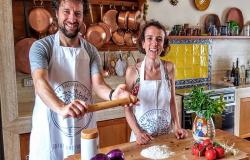(ANSA) - Italy produces more organic crops than any other country in Europe, according to the International Federation of Organic Agricultural Movements (IFOAM).
Figures released on the eve of SANA, an international nature, health and environment fair running here until Sunday, also showed that Italy was the third largest organic producer in the world after Australia and Argentina.
Nearly 7% of Italian soil utilized is given over to organic farming. This amounts to approximately a million hectares, accounting for 27% of all organic agriculture in Europe and 3.9% around the world.
Italians export a third of their organic output, mostly citrus fruits, olive oil, dairy products and eggs. Organic imports include vegetables, sugar and livestock.
SANA organizers said that Italy was particularly far behind in the third sector, where imports have risen by 70.5% since 2002.
Italy boasts a thriving organic market, with an annual turnover of 1.4 billion euro. This makes it fourth in Europe, where organic sales increased by 5% last year. The Germans far outstripped other nations in organic spending last year, forking out 3.1 billion euros. They were followed by the British at 1.6 billion and the French at 1.4 billion euros.
The average Italian household spends around 80 euros on organic produce each year, according to SANA. Although there was a small drop in expenditure last year, down 0.3% on the previous year, this was smaller than the decline in spending on farm produce overall, said SANA.
The number of organic farms in Italy also fell last year, down 15.5% to 41,000, according to the Italian agriculture ministry's organic observatory, SINAB. This decline was most marked in the country's poorer regions, including Sardinia (down 78%), Puglia (-52%), Calabria (-48%) and Sicily (-48%).
Better-off regions in the north, such as the Marche and Valle d'Aosta, reported an increase in organic farming. Analyzing the data, SANA suggested that the drop was partly attributable to a lack of funding on the part of the European Union. But it stressed that while there were fewer primary growers, there had been a corresponding rise in the number of Italian manufacturers and retailers using organic goods, which rose 8.4% in 2004.
"Furthermore, the drop in the number of organic farms has not affected the quantity of organic produce being bought by Italians," added SANA. Figures by the Organic Consortium for Sustainable Development appear to confirm Italy's continuing love affair with organic food.
The country's only organic food chain store, Naturasi, reported a 13% rise in sales last year.
This growth continued during the first half of this year, where turnover rose a further 13% on the same period in 2003.









